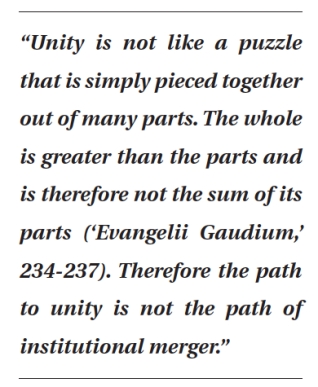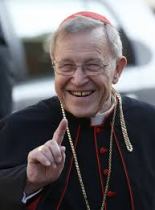

If Cardinal Kasper can say this
about ecumenical unity,
might this wisdom for unity
apply as well WITHIN the Church?
Might this be the wisdom we need
WITHIN our polarized Roman Catholic Church?
…a Church polarized by its different interpretations of
the Second Vatican Council
…a Church polarized between
those who hold minimum assent to the Council
and
those who see Vatican II as whole new direction for the Church?
Could different interpretations of Vatican II on
Catholic doctrine, governance, and liturgy
make the Church stronger and more ALIVE
IF…
the Church allows them to flourish side by side,
challenging and learning from each other?
Two recent ways divergent factions have already been incorporated into the Catholic Church by Rome:
I. Pope John Paul II protected Opus Dei’s right to grow its practice of fundamentalist Catholicism worldwide during the post Vatican II reform era.
Pope John Paul II did this by granting “Personal Prelature”
juridical status to Opus Dei in 1982
with the proclamation of the Apostolic Constitution “Ut Sit”.
https://www.ewtn.com/library/CURIA/CBISUTSI.HTM
“Personal prelatures are one of the organizational tools the Church has at her disposal to provide for pastoral needs (Annuario Pontificio 2008, p.1872).
“The juridical form denominated as ‘personal prelature’ was envisaged in the Second Vatican Council (Ad Gentes and Presbyterorum Ordinis). Article 10 of Presbyterorum Ordinis (December 7, 1965), established that ‘in order to carry out particular pastoral tasks for different social groups in certain regions or nations, or even all over the world,’ in the future, ‘particular dioceses or personal prelatures’ could be set up.”
(Excerpt from: Romana – Bulletin of the Prelature of the Holy Cross and Opus Dei)
II. Like the Personal Prelature, the Personal Ordinariate, formally erected by Pope Benedict XVI is another organizational tool the Church has at her disposal to provide for the pastoral needs.
In 2009, in response to inquiries from Anglican groups worldwide, Pope Benedict XVI issued an
apostolic constitution, “Anglicanorum Coetibus”.
On 15 January 2011 the Congregation for the Doctrine of the Faith issued a Decree which formally erected a Personal Ordinariate that enables Anglicans to enter into full communion with the Catholic Church, while preserving those elements of the Anglican tradition which are consonant with the Catholic Faith.
ordinariate.org.uk /about/faq.php
Most recently HOUSTON — In a majestic Mass at Houston’s Co-Cathedral of the Sacred Heart on Tuesday evening, history was made for the Anglican ordinariates established by Pope Benedict XVI: Their first bishop was ordained. “In a nutshell, it means we’re here to stay,” summarized Msgr. Harry Entwistle, the ordinary of Australia’s ordinariate, which is under the patroness of Our Lady of the Southern Cross.
http://www.ncregister.com/daily-news/first-anglican-ordinariate-bishop-ordained-it-means-were-here-to-stay
Conclusion
Since the Church has at her disposal these juridical tools to provide for pastoral needs (Annuario Pontificio 2008) for different social groups in certain regions or nations, or even all over the world (Presbyterorum Ordinis)…
…what about world-wide pastoral needs of reform-minded Vatican II Catholics…cardinals, bishops, priests, theologians, laity both secular and religious?
…and all those Catholic women and men who see Vatican II reform/adaptation differently from fundamentalist Catholicism which demands strict and literal adherence to doctrine, liturgy, governance and tradition as practiced before Vatican II?
…Wouldn’t “Prelature” or “Ordinariate” juridical status be feasible for Vatican II Catholics, particularly for those who have established themselves in intentional Vatican II dioceses, groups, and parishes?
Wouldn’t Prelature or Ordinariate juridical status provide a welcoming home especially for marginalized Catholics and those within the Church who have spent the past 50 years working in hope of a deep Vatican II Reform of Catholicism.
…A deep reform that is quite different from George Weigel’s “Catholic Evangelicalism”.
Perhaps Pope Francis would be interested in establishing a Vatican II Personal Prelature or Ordinariate for Vatican II Catholics left out on the fringes of the Church for the past 35 years? ? ?
What do you think?

I can see the intention for this, empathize with it. However, I think there is another way to unity through dialogue among people of different worldviews.
The postmodern cultural view that all are equally valid ways of viewing “reality” supports this strategy for unity, but is it true that Vatican II can be interpreted both as true to the Gospel in opening to the world and as not true to the Gospel in opening to the world? Isn’t there some objectivity in what the Gospel teaches and how the Church should exist in the world?
What about the Petrine Ministry to lead in the Gospel direction? Should the Pope say “all interpretations of Vatican II are valid”?
Weigel says the Council bishops were “naive” in opening the Church to the world when Western culture was on the verge of a massive shift in the 1970s. The Church should instead insist on its own traditional view of the authority of the bishops from God.
The question I have about dividing us up is this: Is it good to abandon the mainstream Church to the point of view that the Holy Spirit is not in the world while establishing an ordinariate that believes the Gospel calls for discerning the Holy Spirit and the Kingdom of God within the world as it is?
Isn’t it better to continue the dialogue among people with evolving worldviews within the Church, depending on the Holy Spirit, faith and reason to keep us together?
Do the believers in the rightness of Vatican II have brave spokespeople who can make the vision clear and compelling to the mainstream Roman Rite Catholic? If not, how are they going to run an ordinariate? I appreciate the “Rite Beyond Rome” effort to discern how we should proceed. I hope we keep talking.
LikeLike
Thank you so much for this seriously thoughtful comment, Paula.
The important points you make and questions you ask deserve more than a cursory reply. We would like to use your comment as the subject of a dialogic article here on Rite Beyond Rome, if that is all right with you.
BTW, we were wondering how you found our website, RiteBeyonRome.com.
Thank you again for your insights and thought-provoking response and your desire to “keep talking”. We look forward to hearing from you. Check your e-mail for our response directly to you.
Sisters Lea and Consilia
LikeLike